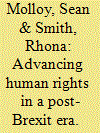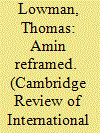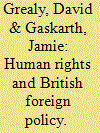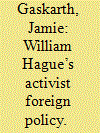|
|
|
Sort Order |
|
|
|
Items / Page
|
|
|
|
|
|
|
| Srl | Item |
| 1 |
ID:
191684


|
|
|
|
|
| Summary/Abstract |
The United Kingdom (UK) has traditionally exerted significant influence on the global human rights agenda through its diplomacy in multilateral human rights forums. This influence, stemming from the UK’s geopolitical standing, its membership of the European Union (EU) and the perception that the UK is a strong supporter and advocate of human rights, has been utilised to advance its own human rights priorities and influence the activities of other states. By examining recent developments, including the UK’s departure from the EU, the rise of populist sentiments internationally and a growing scrutiny of the UK’s domestic human rights record, this article explores both the opportunities and challenges posed by these emerging challenges. In so doing, the analysis casts doubt on the unfettered optimism of ‘Global Britain’, the idea that the UK can emerge from its ties with the EU as an influential actor in the field of human rights.
|
|
|
|
|
|
|
|
|
|
|
|
|
|
|
|
| 2 |
ID:
191680


|
|
|
|
|
| Summary/Abstract |
This article explores the role of human rights discourse in reframing the changing diplomatic relationship of the United Kingdom and Uganda during Idi Amin’s dictatorship of 1971-1979. The emergence of a violent military dictatorship in Uganda in the early 1970s posed difficult questions for Britain, which had played a central role in the creation of the Ugandan nation-state in the colonial era and maintained many connections to it. In the first years of Amin’s rule the UK had adopted a pragmatic stance, in which human rights concerns were not considered, and geopolitical and economic concerns came first. However, in the mid 1970s the emergence of an energetic transnational ‘community of conscience’ contributed to a reframing of the UK’s stance on Uganda in explicit human rights terminology. This was a limited and sometimes contradictory shift that also served to obscure embarrassing aspects of the UK-Uganda relationship.
|
|
|
|
|
|
|
|
|
|
|
|
|
|
|
|
| 3 |
ID:
191681


|
|
|
|
|
| Summary/Abstract |
The efforts of the Soviet authorities to suppress political opposition are widely known, utilising psychiatry to ‘treat’ political dissidents and the widespread, state-endorsed persecution of religious believers. These human rights violations often became flashpoints in the Cold War, shaping international relations and offering a moral weapon through which the Soviet Union could be attacked. Given the tightly controlled nature of information in the Soviet bloc, how did academics, journalists, and politicians in Britain know about this persecution? How could information obtained on the position of political dissidents be trusted in the West, and how did it end up influencing those in positions of power? Given recent events in Russia, understanding the historic response to human rights violations in the Cold War offers the space to reflect on contemporary concerns. This article argues that parallels can be drawn between human rights concerns in the Soviet and post-Soviet world, and that understanding historic case studies can offer insight into the efforts of contemporary activists. Alongside this, it argues that the efforts of activists in Britain need to be considered in order to understand the way in which human rights issues in Russia are understood, placing these concerns into an international context.
|
|
|
|
|
|
|
|
|
|
|
|
|
|
|
|
| 4 |
ID:
191683


|
|
|
|
|
| Summary/Abstract |
This article explores how the UK’s selective neglect in linking the Responsibility to Protect (R2P) to its peaceful responses to Syria reinforces the claim that R2P is predominantly understood as military humanitarian intervention, which is deleterious for building international consensus for atrocity prevention and response. It does this through an empirical case study of the UK’s responses to Syria during 2014-2016 when the UK’s peaceful responses expanded, providing rich data for examining their underlying motivations. The article provides a case study of the UK’s contestation of R2P’s peaceful measures that builds upon existing work around the limits of contestation and norm degeneration due to how it feeds back to the international level. The article also explores the intersection between contestation and localisation and how the UK’s particular localisation of R2P feeds into claims and fears of western imperialism, which obstructs effective atrocity prevention and response.
|
|
|
|
|
|
|
|
|
|
|
|
|
|
|
|
| 5 |
ID:
191678


|
|
|
|
|
| Summary/Abstract |
This Special Issue brings the broader history of ‘ethical’ foreign policymaking in the UK into conversation with more contemporary case studies. In doing so, it highlights key issues that have shaped, and will continue to impact, Britain’s ability to play a leading role in the advancement of human rights norms and institutions as a ‘middle power’ within a shifting global order (Cooper and Dal, Citation2016; Efstathopoulos Citation2018; Murray and Brianson Citation2019). For some time, scholarly engagement with the ethics of British foreign policy and human rights promotion was dominated by discussion of New Labour’s foreign policy outlook as articulated in Robin Cook’s ‘mission statement’ for the Foreign and Commonwealth Office (FCO) in May 1997. British foreign affairs, Cook asserted, must have an ‘ethical dimension’ and the Labour government would therefore put human rights ‘at the heart’ of its foreign policy – a line that morphed in the media into ‘ethical foreign policy’ (Guardian, Citation1997). While New Labour has been credited for breaking new ground in terms of British engagement with the international human rights regime, this Special Issue looks to examine periods either side of the Cook era, to gain a wider historical picture of how human rights have been incorporated into British foreign policy (Wheeler and Dunne Citation1998; Gaskarth Citation2006; Gilmore Citation2015).
|
|
|
|
|
|
|
|
|
|
|
|
|
|
|
|
| 6 |
ID:
191679


|
|
|
|
|
| Summary/Abstract |
Following his appointment as Foreign Secretary in February 1977, David Owen framed human rights promotion as a guiding principle of British foreign policy. Sensitive to Iran’s significance as a pro-Western power in the Middle East and appreciative of the opportunities that the Shah’s custom provided for British business, Owen would continue to champion human rights promotion as a central pillar of Britain’s international agenda while simultaneously providing support to the Shah’s dictatorship. This article scrutinises Owen’s attempts to rationalise this fundamental contradiction by constructing a ‘morality of compromise’ which drew inspiration, inter alia, from the value pluralism espoused by the philosopher Isaiah Berlin. In so doing, analysis not only complements and builds upon existing coverage of Anglo-Iranian relations and the marginalisation of human rights concerns therein; it also highlights the importance of moral psychology and its role in shaping ethical foreign policymaking at an individual level.
|
|
|
|
|
|
|
|
|
|
|
|
|
|
|
|
| 7 |
ID:
191682


|
|
|
|
|
| Summary/Abstract |
Assuming office as UK Foreign Secretary in 2010, William Hague asserted a desire to pursue an ‘activist foreign policy’. Despite studies into Hague’s period in office, the significance of this phrase and its implications for Hague’s diplomacy have been overlooked. This article plugs that gap. It suggests ‘activist foreign policy’ merges two separate and potentially conflicting practices, namely, activism and diplomacy. Using insights from the practice turn, we examine two policies of Hague’s tenure: his promotion of the Prevention of Sexual Violence Initiative (PSVI), 2012–2014 and his diplomatic response to the Syria conflict, 2011–2014. Exploring these cases highlights the creative potential of merging practices, but also the extent to which they can conflict in ways that provoke resistance from other participants. The article concludes that policymakers looking to merge practices need to be aware of the underlying logic of behaviours and actions within each practice to transpose them successfully.
|
|
|
|
|
|
|
|
|
|
|
|
|
|
|
|
|
|
|
|
|